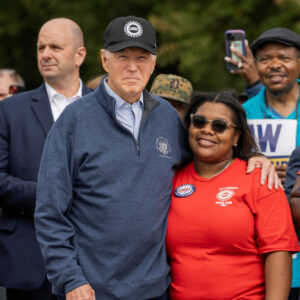In an unprecedented move by a sitting president, Joe Biden joined a United Auto Workers picket line in Michigan on Tuesday in a strike against Ford, General Motors and Stellantis. White House press secretary Karin Jean-Pierre indicated the president wants to make it clear that he stands on the side of workers.
This oversimplification suggests just two sides to the controversy — labor and management. But there is at least one other important side: consumers, and lots of them. Some families and communities suffer when a major employer is shuttered, with ramifications for schools, churches and governments.
Why would a sitting president — one who promised to be the president of “all Americans” when taking office — decide to favor the UAW alone? Yes, workers have every right to strike and negotiate with their employers. And, yes, Biden has long supported labor. But the cold shoulder to consumers and affected communities across America still feels blatant.
Speaking of blatant, Biden’s picket-line visit came one day before former president Donald Trump’s promised prime-time speech to a UAW audience in Detroit. Once more focused on the quid pro quo, he made it clear that his participation was strictly political, pointing out that “if the UAW ‘leadership’ doesn’t ENDORSE me, and if I don’t win the Election, the Autoworkers are ‘toast.’”
Like most of us, autoworkers would justifiably like shorter hours, higher pay and improved working conditions. But let’s balance that by looking at the management, or investor, side, and then the customer side.
The share prices of Ford and Stellantis have underperformed for years, and, other than a value run-up and back down in 2021, GM has been caught in a doldrum since 2013. Shareholders don’t draw much sympathy, but will they keep providing necessary investments if the cost of doing business, driven by politicians, rises?
Indeed, consumers who already face astronomical vehicle prices and understand that higher autoworker wages will lead to even higher prices, deserve some sympathy. The average new-vehicle price is now above $48,000, up $10,000 since 2020.
So, if Biden and Trump take sides, some may wonder: “Why not mine?”
The obvious answer is politics and the importance of winning union support (and winning union-heavy states in an election year). Just how consequential is this? Conveniently, a century-old policy playing a large role in the current situation also happens to illustrate Congress’ longstanding willingness to prioritize organized workers over unorganized customers.
The UAW was once far more powerful than it is today. In 1979, membership peaked at 1.3 million workers; today’s tally is 383,000. According to Bureau of Labor Statistics data, there are now just over 1 million U.S. autoworkers. Simple subtraction suggests more than 600,000 are not union members. Indeed, more are employed with firms like BMW, Hyundai, KIA, Mercedes, Nissan, Tesla, Toyota and Volvo rather than the traditional, heavily unionized American powerhouses.
Therefore, the UAW cannot employ the labor monopoly power required to shut down the industry. It is, however, exercising legal authority to restrain trade granted by the 1914 Clayton Act and Norris-LaGuardia Act of 1932. Before that legislation, the Supreme Court considered union attempts to restrain trade in interstate commerce as unlawful attempts to monopolize.
Congress felt differently, dictating in the Clayton Act that labor is not commerce. Now, unions may interrupt commercial activity as long as the disruption takes place within the limits of labor law. The UAW understands that their strike will not be effective unless the cost is felt.
Labor and management don’t always see eye to eye; strikes happen and unions deserve fair treatment. But would it be too much to expect our national leaders to express the hope that, for the sake of workers, their employers and all Americans, this strike will be short? That we should remember our slogan, “e pluribus unum”? We are one nation formed from many parts and at our best when we are as united as possible. That means taking sides with as many Americans as possible, not just those on a picket line.

